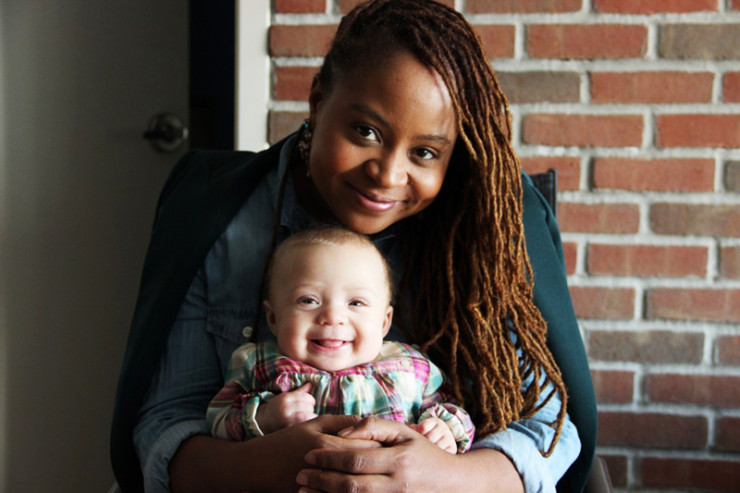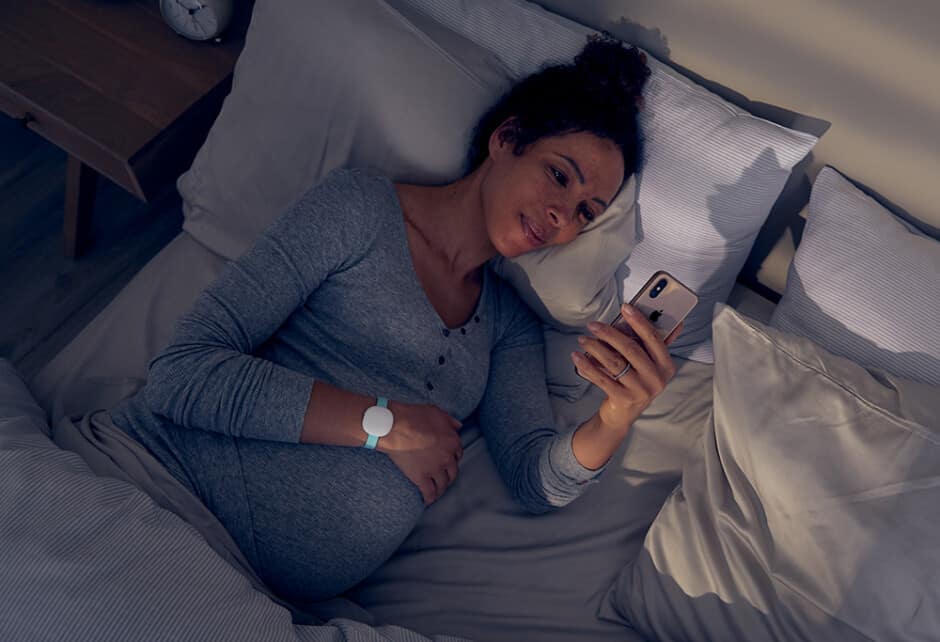
Paths To Motherhood: IVF
Written by Katie Hintz-Zambrano
Photography by Photo Courtesy of Alexandra Phanor-Faury
Knowing that not all families are started the super traditional way (i.e. girl gets pregnant with ease, pops out baby), we bring you our column Paths To Motherhood, highlighting women who have taken a less than typical route to becoming a mother.
Alexandra and Anaïs Phanor-Faury
Brooklyn, NY
When did you start looking into IVF?
“As soon as I wanted a baby, that’s when I learned that having one wasn’t going to be easy for me. After trying for a year, I knew something was up. My OBGYN sent me to take a hysterosalpingogram, or HSG test, to determine if my fallopian tubes were blocked. They were both blocked. It was then that I went to see a fertility expert.”
What about IVF appealed to you, versus other paths to parenthood (adoption, etc.)?
“The IVF process is definitely not an easy one. It’s mentally and physically arduous, not to mention very expensive. Nevertheless, in our case we felt it was the best choice. My hat goes off to couples who adopt and God knows there are so many children, especially black children, in need of loving homes, but we really wanted to have a child of our own. Perhaps if IVF never worked for us, we might have looked into adoption.”
Tell us about the IVF process. How does it work?
“We were very lucky that my eggs and my husband’s sperm were healthy. The problem was getting them to meet, and since my fallopian tubes were blocked, it was impossible. My only option was to remove my eggs from my ovaries and combine them with his sperm outside my body. Once an embryo was formed it was placed back into my uterus. Before this retrieval takes place, I (really, my husband) had to give myself daily shots of medication to help develop my eggs and start ovulation. The success of the IVF process rests heavily on timing. The shots have to be taken at exactly the time prescribed. The eggs need to be retrieved just before they come out of the follicles in the ovaries, no sooner or later. The development of your eggs is followed very closely, which means daily visits to the doctor for blood tests and ultrasounds.”
How much does it cost?
“We were lucky that our health insurance covered one cycle and since I got pregnant on the second cycle, our out-of-pocket costs were somewhat reduced. The cost really depends on your insurance, age/probability to get pregnant quickly, and health condition. I don’t think our case is representative of most people’s experience. In any case, you should be prepared for a substantial cost. It’s also smart to consult with a financial advisor on what most clinics have available to help you navigate costs and reimbursements.”
Was it physically hard to go through?
“I had read so much about IVF before starting my first round that I was prepared for the worst. I definitely experienced some side effects, such as headaches and mood swings. You can imagine my husband just loved that part! Having to take shots every day is exhausting, but it all pretty much became routine. Some people spend years trying to conceive and we were very blessed that it worked after two cycles. One cycle is about four to six weeks. If I had to spend years trying, I’m sure our experience would have been completely different.”
Did you guys discuss what you would do if you were unsuccessful with the IVF?
“They say the IVF process can be stressful on a relationship, but that wasn’t the case for us at all. We approached the journey very calmly and didn’t place any kind of crazy pressure on ourselves. We were optimistic, but also very realistic. A lot of women I met at the clinic were totally consumed and completely stressed out by the entire process. I think those are the stories we hear about the most. We wanted nothing more than for me to get pregnant, but we knew we had no control over it. All we could do is follow our doctor’s instructions and hope for the best. If it didn’t happen, then we would try again. We decided we wouldn’t spend years trying. If it didn’t happen, then that is what was in the cards for us. We didn’t want to be one of those couples who try for years and years desperately and put so much strain on their marriage. The first attempt failed, but that was due to bad timing rather than a fundamental issue with fertilization or eggs. This gave us more confidence we would be successful the second cycle. My husband was very supportive, compassionate, and understanding.”
Tell us about the day you found out you were pregnant.
“We found out I was pregnant around Christmas. It was right before we were leaving to Paris for the holidays. We were ecstatic! I was very doubtful at first because I had some really bad cramps and was convinced that I was getting my period. I decided to take a home pregnancy test before going to the clinic. I was debating whether I should take the at-home test since they say they aren’t 100% accurate. Some women will have a negative urine result after the transfer, only to find out they are pregnant at the clinic through a blood test. My urine test was positive, but we tried not to get too excited just yet. It wasn’t until the positive result came through at the clinic that we were over the moon.”
What are the pros and cons of IVF, in your opinion?
“The biggest pro is that it allows women with fertility issues the chance and ability to have a baby. The con is the waiting game, anxiety, and stress that comes with it.”
How long did it take from starting your IVF treatments and getting pregnant?
“It took about two months for both cycles.”
What was the toughest part about choosing this path to motherhood?
“It really wasn’t tough choosing the IVF route at all. It was a big relief to know there was an option out there for us to be able to conceive a baby. I never carried any shame about having to turn to IVF to get pregnant. It never made me feel less of a woman or a failure. I know some women who don’t like to share with others that they turned to IVF and think it’s weird that I’m very open about it.”
How common is it that women trying IVF are successful?
“Most women aren’t successful on their first try. The success rate differs depending on a woman’s age and the infertility issue. Most commonly, women under 35 have a 39% chance of success. The chances decrease a lot as you get older. It also depends on what your fertility issue is. No two stories are alike. Everyone has different health issues. Some women don’t produce eggs, some men don’t have healthy sperm, etc.”
After going through the process, would you do it again?
“We always knew we only wanted one child, so we won’t be going through IVF again.”
Is motherhood everything you thought it would be? Tell us what you love about it!
“I am so grateful for the wonders of IVF, because without it our baby girl, Anaïs, wouldn’t be here. Today, it’s hard for me to believe that there was ever a time when being a mother was something I never wanted. I always loved babies. My nieces and nephews always meant the world to me, but I could never picture children in my life. I took pride in not falling victim to the societal pressures put on women to be mothers. That all changed when I met my husband. While we were both on the same ‘no baby’ page when we got married, after a couple of years we’d start daydreaming about a little offspring. Being a mother is amazing, beautiful, scary, and overwhelming. What I love most about being a mother is the unconditional love shared between us and them.”
Share this story



